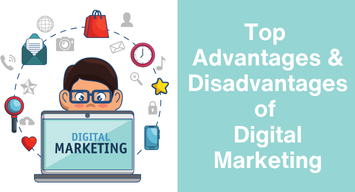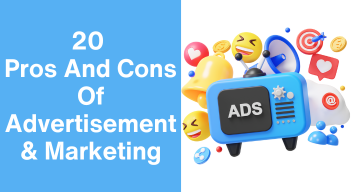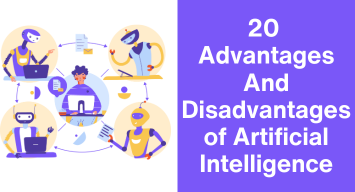Top Advantages and Disadvantages of Digital Marketing in 2025
Introduction Digital marketing has transformed how companies engage with their target audience. In our chaotic lives, it is an unavoidable method of reaching new clients, encouraging brand exposure, and generating sales. However, like any powerful method, digital marketing has its own challenges. In this blog post, we will discuss the advantages and disadvantages of digital marketing in 2025, as well as demonstrate ways for businesses to approach the uncertain ground of digital marketing practice. Moreover, we are also going to share the various digital marketing benefits, which include accessibility, cost-effectiveness, and measurability. Also, there are various challenges, such as over-saturation, privacy issues, and technical issues. It’s beneficial to understand that both aspects will inform and clarify a decision regarding a digital marketing strategy and the outcome. Advantages of Digital Marketing for 2025 1. Wider Reach and Global Access Wider Reach and Global Access expand the doors of modern marketing. It is allowing businesses to reach audiences across the globe, which is not possible with traditional marketing. It allows for targeting numerous customers residing in various different regions by making use of digital marketing platforms, like social media, search engines, and email services. Moreover, this would allow an SME to scale on a larger and bigger level without necessarily having to be based in several locations. Thus, through an extension of outreach, businesses can enter overseas markets and attract diverse customers who would previously not have been known, further enhancing the potential for growth and increased brand exposure. 2. Cost-effective Marketing Solutions One of the biggest advantages of digital marketing is how cost-effective it is compared to traditional methods. You don’t need a massive budget to get started. Platforms like Facebook, Instagram, Google Ads, and email marketing let you run targeted campaigns at a fraction of the cost of print, TV, or radio ads. Even small businesses can reach a global audience with just a modest budget. What makes digital marketing even more appealing is the control it offers. You can set daily or lifetime budgets, adjust campaigns in real-time, and focus your spending on the audiences that matter most. Whether you’re targeting people by location, interests, or behavior, these platforms give you the flexibility to test what works—and pause what doesn’t—without wasting money. If you really want to make the most of this approach, investing in an Advanced Performance Marketing Training can be a game-changer. These courses teach you how to build smart, results-driven campaigns that actually convert—whether that means generating leads, boosting sales, or increasing app downloads. You’ll learn how to analyze your campaign performance, optimize ads for better results, and make every dollar work harder. It’s not just marketing—it’s measurable, strategic growth. 3. Advanced Targeting with AI and Machine Learning Advanced targeting with AI and machine learning significantly enhances digital marketing by enabling precise audience segmentation and personalized content delivery. These AI technologies analyze huge amounts of data to identify patterns and predict customer behavior, allowing marketers to target specific demographics, interests, and behaviors more accurately. This leads to more relevant and engaging advertisements, higher conversion rates, and improved ROI. Additionally, AI and machine learning can optimize ad placements and bids in real-time, ensuring that marketing efforts are both efficient and effective. By leveraging these advanced tools, businesses can create more impactful and tailored marketing campaigns that resonate with their target audience. Additionally, AI strategy consulting can ensure seamless integration of AI into businesses, aligning it with overall goals. 4. Real-Time Performance Tracking One of digital marketing’s major advantages is the ability to monitor campaign metrics in real time. This technique allows marketers to see what is going on quickly, determine trends, evaluate the effectiveness of the implemented strategies, and immediately make adjustments to optimize results. Some key metrics measured in real time include website traffic, conversion rates, click-through rates, and engagement levels. Using these forms of data can amplify marketers’ decision-making abilities, align them with better customer targeting, and maximize ROI. 5. Increased Customer Engagement Increased customer engagement is one of the most important aspects of digital marketing. It refers to the enhanced interaction between businesses and their customers through digital marketing channels. By using social media channels such as Facebook, Instagram, and more, along with email campaigns and personalized content, businesses can engage and connect with customers in real-time, observing their needs and preferences more effectively. This continuous interaction with clients builds stronger relationships, boosts customer loyalty, and encourages repeat business. Moreover, it allows companies to gather valuable feedback and insights from clients, enabling them to refine their strategies and improve customer satisfaction. 6. Improved conversion rates Improved conversion rates are one of the most significant benefits of digital marketing. This refers to the increased percentage of visitors who take a desired action on your website, such as purchasing, signing up for a newsletter, or filling out a form. Using digital marketing strategies such as advertising, personalized content, and A/B testing helps optimize user experience and engagement. This leads to higher conversion rates by effectively guiding potential customers through the sales funnel, reducing friction points, and addressing their needs more precisely. Strong pipeline management ensures these strategies are aligned and consistently move leads toward conversion. Ultimately, improved conversion rates result in better return on investment (ROI) and business growth. 7. Omnichannel Marketing Opportunities I hope you have heard about omnichannel marketing. If not, let me explain it to you. Omnichannel marketing is a strategy that integrates various channels of communication to deliver a consistent and seamless customer experience across multiple platforms, such as online, in-store, social media, and mobile apps. This practice ensures that clients receive consistent messaging and can interact with a brand through their preferred channels, improving customer satisfaction and loyalty. By using this strategy, businesses can understand customer behavior, personalize marketing efforts, and drive higher engagement and sales for their products or services. 8. Flexible Campaigns As Compared to traditional marketing, digital marketing offers greater flexibility in campaigns. It allows for the quick adjustment and optimization of marketing strategies based on … Read more










